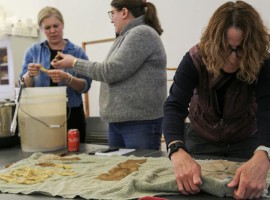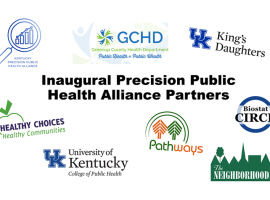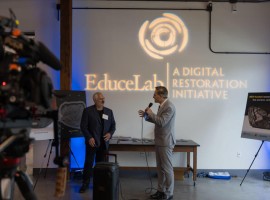Danelle Stevens-Watkins Leading UK’s Newest Effort to Impact Change

University of Kentucky alum and native Kentuckian Danelle Stevens-Watkins is impacting change in the Commonwealth and beyond by uniting research and scholarship focused on achieving racial equity.
In August, Stevens-Watkins was appointed UK’s Assistant Vice President for Research in Diversity and Inclusion after President Eli Capilouto announced a five-year, $10 million commitment to sponsor UK research focused on racial disparities and inequity.
In her newest role, UK’s Director of Graduate Studies in the College of Education will lead UNITed in racial Equity (UNITE) Research Initiative – UK’s newest research priority area (RPA).
UNITE has two goals: to support research focused on racial disparities, racial health equity, social and racial justice – and to recruit and retain racially diverse faculty, staff and students at UK. The RPA will consolidate research across campus to harness the full power of UK intellectual capital to promote diversity and inclusion.
UKNow talked with Stevens-Watkins about her vision as she takes the helm of UK’s newest RPA:
UKNow: What is the current status of UNITE since being launched?
I have established an internal advisory committee for UNITE and we are in the beginning stages of planning programs, announcements and opportunities. We are also recruiting members. UNITE currently has more than 140 members including faculty, staff and students from 14 colleges across UK.
UKNow: What excites you about UNITE?
The University of Kentucky is a powerhouse research institution. UNITE can help to leverage our existing strengths to bolster our research portfolio related to racial inequity and disparities.
UK has a negative reputation among many Black communities in Kentucky from historical mistreatment. Today, I believe the university is making a strong statement in the Commonwealth moving forward and righting some of those wrongs by declaring racial equity a research priority area. The investment made by President Capilouto and Vice President for Research Lisa Cassis speaks volumes. The culmination of this new RPA will undoubtedly have a positive and sustained impact on racially marginalized communities.
UKNow: How will your status as a UK alumna and native Kentuckian inform your efforts in this role?
My experience as a student at UK was phenomenal. When I came back as a faculty member initially in 2008 and again in 2013, I became really interested in how we can harness our research strengths to positively impact racial disparities in the Commonwealth.
As a native Kentuckian, I've experienced the problems related to racial inequity in the Commonwealth firsthand. I come from a single-parent home living below the poverty threshold in one of Kentucky’s lesser-resourced communities.
With UNITE, we have the best and the brightest scholars at UK bringing our heads together and thinking about innovative research projects and interventions that can positively impact communities of color across the Commonwealth. That’s very personal to me. And as an alum and a Kentuckian, it really energizes me.
UKNow: What is your research background?
My research is primarily focused on African American health disparities. I’m interested in understanding more about drug abuse, mental health and HIV risk among Black populations and currently working on a large-scale study looking at opioid use in African American communities in Kentucky. Similar studies in Kentucky and nationally have been focused on rural white populations, but this is an issue impacting Black communities, too. So, we’re filling a gap in the research that's out there with a project that was recently funded by the National Institute on Drug Abuse (NIDA), part of the National Institutes of Health (NIH), for $3.2 million.
I also study maternal health outcomes and breastfeeding among African American women. Statistics show that maternal mortality rates are disproportionately higher for women of color, and this cuts across socio-economic status.
For these studies, I’ve been lucky to work with a stellar team of underrepresented minority graduate students and collaborating with scholars in my department like Candice Hargons, as well as others from across the university, including Carl Leukefeld in Behavioral Science and Carrie Oser in Sociology. UNITE can help cultivate similar research collaborations across disciplines at UK.
UKNow: How will UNITE help facilitate research across the university?
In just the two months that I've been in this position, I've met so many people across campus whose research is related to racial equity. Experts across the university are already engaged in similar research, but many may not know because they are part of different colleges or disciplines. UNITE can be a catalyst to bring all of these faculty together. Doing so will make grant applications more competitive and inspire new collaborations across disciplines.
UKNow: What are some of the obstacles institutions face when it comes to increasing diversity in research and how can UNITE help?
First is recruitment and retention of more diverse faculty, staff and students. UNITE is different from the other research priority areas by having that as a goal. Right now, the advisory committee is currently collaborating with the provost’s office and faculty advancement to work on innovative strategies for recruitment and retention.
We know that scholars are often attracted to and will stay at institutions where they experience synergy and support for their research. By offering this support through programming and initiatives, UNITE can help draw in talented underrepresented minority faculty members that will become established at UK.
In addition, UK’s historical reputation may have negatively impacted recruitment efforts for diverse faculty and students. UNITE is making a strong statement in support of racial equity that can help turn this around.
There are also obstacles to sourcing grant funding for racial equity research that UNITE can help with. There are many reasons why it is not easy to get funds for this type of research, and systemic racism is one of them. While funding agencies are beginning to recognize this, it’s still not easy. UNITE organizes a group of established scholars that are already doing impactful research and are able to gather together in a team and put forward competitive applications – and this will improve those chances greatly.
UKNow: What are your thoughts as you begin this new leadership role during unprecedented times with the COVID-19 pandemic and current social justice movement?
In some respects, the COVID-19 pandemic has allowed racial injustice to have a spotlight. It’s giving many people the time to witness injustices they may have never noticed before. But racism and the brutality captured on video now are absolutely not new.
COVID-19 is also bringing many public health racial disparities to light. It is yet another major health disparity disproportionately impacting communities of color. And the impacts go beyond disparate access to care and the quality of health care received by people of color. For example, due to the historical abuses of Black people by the U.S. government and other institutions, many people of color may be unwilling to take part in clinical trials for COVID-19 vaccines.
UNITE researchers are actively working on studying the social justice impacts of COVID-19. The pandemic is certainly putting a spotlight on some issues for people who don't necessarily have to deal with racism as a day-to-day experience or folks who are privileged not to. But this spotlight and increased attention is giving us an opportunity to make changes.





